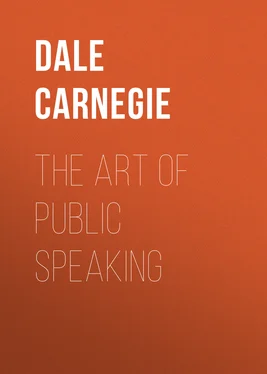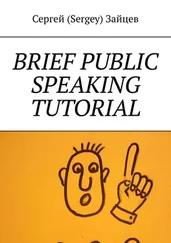Charles Dana, the famous editor of The New York Sun , told one of his reporters that if he went up the street and saw a dog bite a man, to pay no attention to it. The Sun could not afford to waste the time and attention of its readers on such unimportant happenings. "But," said Mr. Dana, "if you see a man bite a dog, hurry back to the office and write the story." Of course that is news; that is unusual.
Now the speaker who says " IT IS A MATTER OF CHOICE " is putting too much emphasis upon things that are of no more importance to metropolitan readers than a dog bite, and when he fails to emphasize "choice" he is like the reporter who "passes up" the man's biting a dog. The ideal speaker makes his big words stand out like mountain peaks; his unimportant words are submerged like stream-beds. His big thoughts stand like huge oaks; his ideas of no especial value are merely like the grass around the tree.
From all this we may deduce this important principle: EMPHASIS is a matter of CONTRAST and COMPARISON .
Recently the New York American featured an editorial by Arthur Brisbane. Note the following, printed in the same type as given here.
We do not know what the President THOUGHT when he got that message, or what the elephant thinks when he sees the mouse, but we do know what the President DID.
The words THOUGHT and DID immediately catch the reader's attention because they are different from the others, not especially because they are larger. If all the rest of the words in this sentence were made ten times as large as they are, and DID and THOUGHT were kept at their present size, they would still be emphatic, because different.
Take the following from Robert Chambers' novel, "The Business of Life." The words you , had , would , are all emphatic, because they have been made different.
He looked at her in angry astonishment.
"Well, what do you call it if it isn't cowardice—to slink off and marry a defenseless girl like that!"
"Did you expect me to give you a chance to destroy me and poison Jacqueline's mind? If I had been guilty of the thing with which you charge me, what I have done would have been cowardly. Otherwise, it is justified."
A Fifth Avenue bus would attract attention up at Minisink Ford, New York, while one of the ox teams that frequently pass there would attract attention on Fifth Avenue. To make a word emphatic, deliver it differently from the manner in which the words surrounding it are delivered. If you have been talking loudly, utter the emphatic word in a concentrated whisper—and you have intense emphasis. If you have been going fast, go very slow on the emphatic word. If you have been talking on a low pitch, jump to a high one on the emphatic word. If you have been talking on a high pitch, take a low one on your emphatic ideas. Read the chapters on "Inflection," "Feeling," "Pause," "Change of Pitch," "Change of Tempo." Each of these will explain in detail how to get emphasis through the use of a certain principle.
In this chapter, however, we are considering only one form of emphasis: that of applying force to the important word and subordinating the unimportant words. Do not forget: this is one of the main methods that you must continually employ in getting your effects.
Let us not confound loudness with emphasis. To yell is not a sign of earnestness, intelligence, or feeling. The kind of force that we want applied to the emphatic word is not entirely physical. True, the emphatic word may be spoken more loudly, or it may be spoken more softly, but the real quality desired is intensity, earnestness. It must come from within, outward.
Last night a speaker said: "The curse of this country is not a lack of education. It's politics." He emphasized curse, lack, education, politics . The other words were hurried over and thus given no comparative importance at all. The word politics was flamed out with great feeling as he slapped his hands together indignantly. His emphasis was both correct and powerful. He concentrated all our attention on the words that meant something, instead of holding it up on such words as of this , a , of , It's .
What would you think of a guide who agreed to show New York to a stranger and then took up his time by visiting Chinese laundries and boot-blacking "parlors" on the side streets? There is only one excuse for a speaker's asking the attention of his audience: He must have either truth or entertainment for them. If he wearies their attention with trifles they will have neither vivacity nor desire left when he reaches words of Wall-Street and skyscraper importance. You do not dwell on these small words in your everyday conversation, because you are not a conversational bore. Apply the correct method of everyday speech to the platform. As we have noted elsewhere, public speaking is very much like conversation enlarged.
Sometimes, for big emphasis, it is advisable to lay stress on every single syllable in a word, as absolutely in the following sentence:
I ab-so-lute-ly refuse to grant your demand.
Now and then this principle should be applied to an emphatic sentence by stressing each word. It is a good device for exciting special attention, and it furnishes a pleasing variety. Patrick Henry's notable climax could be delivered in that manner very effectively: "Give—me—liberty—or—give—me—death." The italicized part of the following might also be delivered with this every-word emphasis. Of course, there are many ways of delivering it; this is only one of several good interpretations that might be chosen.
Knowing the price we must pay, the sacrifice we must make, the burdens we must carry, the assaults we must endure—knowing full well the cost—yet we enlist, and we enlist for the war. For we know the justice of our cause, and we know, too, its certain triumph.
— From "Pass Prosperity Around," by Albert J. Beveridge, before the Chicago National Convention of the Progressive Party .
Strongly emphasizing a single word has a tendency to suggest its antithesis. Notice how the meaning changes by merely putting the emphasis on different words in the following sentence. The parenthetical expressions would really not be needed to supplement the emphatic words.
I intended to buy a house this Spring (even if you did not).
I INTENDED to buy a house this Spring (but something prevented).
I intended to BUY a house this Spring (instead of renting as heretofore).
I intended to buy a HOUSE this Spring (and not an automobile).
I intended to buy a house THIS Spring (instead of next Spring).
I intended to buy a house this SPRING (instead of in the Autumn).
When a great battle is reported in the papers, they do not keep emphasizing the same facts over and over again. They try to get new information, or a "new slant." The news that takes an important place in the morning edition will be relegated to a small space in the late afternoon edition. We are interested in new ideas and new facts. This principle has a very important bearing in determining your emphasis. Do not emphasize the same idea over and over again unless you desire to lay extra stress on it; Senator Thurston desired to put the maximum amount of emphasis on "force" in his speech on page 50. Note how force is emphasized repeatedly. As a general rule, however, the new idea, the "new slant," whether in a newspaper report of a battle or a speaker's enunciation of his ideas, is emphatic.
In the following selection, "larger" is emphatic, for it is the new idea. All men have eyes, but this man asks for a LARGER eye.
Читать дальше












